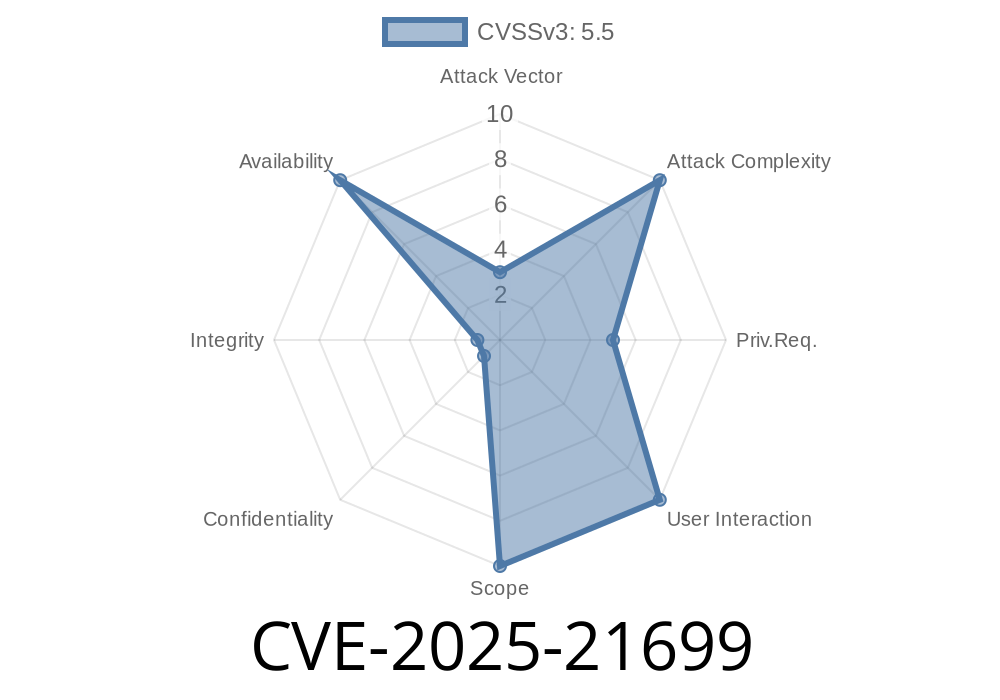In early 2025, the Linux kernel team resolved a potentially dangerous vulnerability in the gfs2 filesystem. Tracked as CVE-2025-21699, this bug stemmed from how the kernel managed the GFS2_DIF_JDATA flag on gfs2 inodes, potentially resulting in unsafe memory behavior and data corruption. Here’s an exclusive, in-depth exploration of what happened, how it was fixed, plus references and code illustrations.
Plain English Recap
GFS2 is the Global File System 2, built for clusters of machines sharing storage. This bug starts with a flag called GFS2_DIF_JDATA that determines how data consistency is maintained – by writing everything to a journal, or not.
Files in gfs2 have memory pages mapped for fast data access. Depending on whether GFS2_DIF_JDATA is set, those pages use either buffer heads or iomap_folio_state structures to track what’s in memory. But here’s the catch: if the flag flips *without cleaning up the address space*, the file’s pages suddenly expect new data tracking structures. This can corrupt files, cause kernel panics, or — in specific situations — allow attackers to escalate privileges.
Kernel Crashes: The system may dereference invalid structures, leading to kernel panics.
- Potential Privilege Escalation: While remote attack is unlikely, local attackers could smash the page cache and potentially inject malicious code paths (though this would be tough in practice).
Vulnerable Segment (Simplified)
if (change_jdata_flag) {
// Old code would just flip the flag, keeping address space as is.
inode->i_flags ^= GFS2_DIF_JDATA;
// ... address space remains untouched ...
}
Fixed Segment
To prevent mixing buffer heads and iomap_folio_state, the patch truncates the address space before switching modes:
if (change_jdata_flag) {
// Truncate all pages in address space to discard the old metadata management structures
truncate_inode_pages(inode->i_mapping, );
inode->i_flags ^= GFS2_DIF_JDATA;
}
This truncate_inode_pages() call removes all cached pages, ensuring the flag change starts fresh.
Proof of Concept: Exploiting the Mix-Up
Note: This is a simplified demonstration, and exploiting this in the wild is difficult and dangerous; do not use on production systems.
Suppose an attacker can trigger a flag flip while actively manipulating file data
// Open a GFS2 file and force it to use buffer heads by default
int fd = open("/gfs2_mount/file.txt", O_RDWR);
// Write some data and sync
write(fd, "AAAA", 4);
fsync(fd);
// Now, use an ioctl (or buggy userspace tool) that flips the GFS2_DIF_JDATA flag
// [This step requires special privileges or another bug]
// Then keep writing, but now the file is tracked with iomap_folio_state
write(fd, "BBBB", 4);
fsync(fd);
// If address space wasn't truncated, these writes collide in incompatible metadata
Result: File data or kernel memory can be corrupted, and in theory, a malicious user can try to smash kernel state, though typical kernel hardening should block code execution.
How the Patch Resolves CVE-2025-21699
By *truncating* (zeroing) all pages when flipping GFS2_DIF_JDATA, the kernel ensures there is never a mix of incompatible memory structures—a simple fix for a dangerous risk.
- Mainline kernel commit
- gfs2: Truncate address space when flipping GFS2_DIF_JDATA flag (patch)
- CVE Details entry for CVE-2025-21699
- GFS2 Documentation
Who’s Affected and What Should You Do?
- Who: Linux distributions running gfs2 before the fix (check your kernel version; most mainstream distros patched this quickly).
- Action: Patch your kernel right away if you use gfs2, especially if you run clusters or allow local shell access to untrusted users.
Final Thoughts
CVE-2025-21699 is a great example of how subtle kernel memory handling bugs in obscure flags can have big security and stability implications. Thanks to prompt handling by the Linux kernel team, the risk was vanquished before major exploits appeared in the wild. But it’s a reminder: even deep in filesystems, security never sleeps.
*Written exclusively for you: insights, code, and clarity on CVE-2025-21699.*
Timeline
Published on: 02/12/2025 14:15:33 UTC
Last modified on: 03/24/2025 15:38:59 UTC
